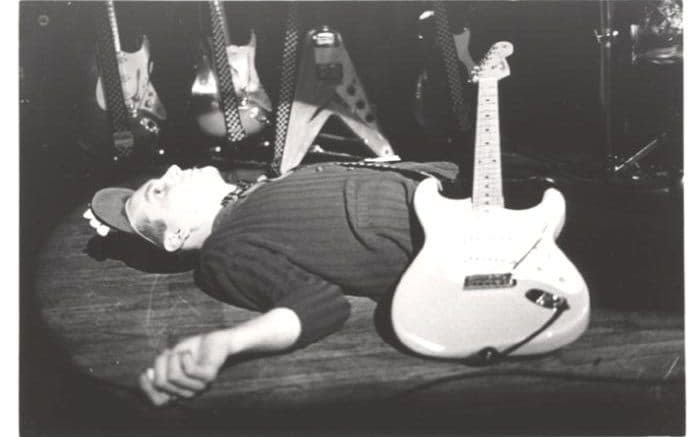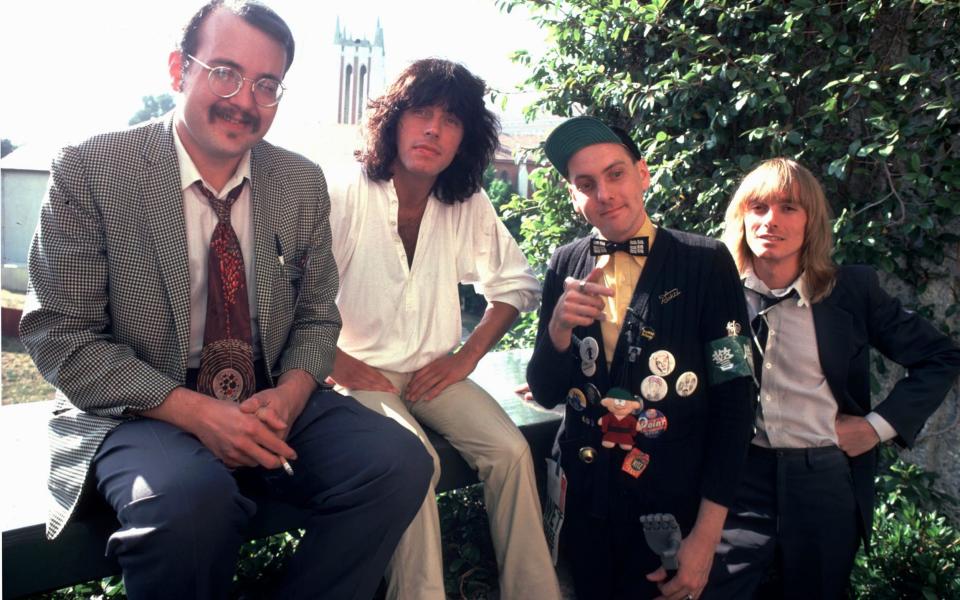Cheap Trick’s Rick Nielsen: ‘Foo Fighters steal from us, only more successfully’

- Oops!Something went wrong.Please try again later.
- Oops!Something went wrong.Please try again later.
Talking to Rick Nielsen is often like talking to a cartoon character. At one point during the interview, the Cheap Trick guitarist actually does talk like a cartoon character. While reminiscing about his band’s appearances on The Simpsons (soundtracking Apu washing his car) and Beavis And Butt-Head, he breaks into an impression of the gruesome twosome’s appraisal of the video for his band’s 1994 song Woke Up With A Monster. “Heh-heh-heh,” he cackles. It’s not so far from the bursts of schoolboy laughter that frequently punctuate his own, smart-mouthed words.
If the line ‘I’m 30 but I feel like 16’ in Cheap Trick’s 1977 song Daddy Should Have Stayed In High School set up the band’s shop window as a place for carefree, youthful abandon where age is but a number, in 2021 only a slight adjustment to that statement is needed. At 72, Nielsen is still American rock ‘n’ roll’s biggest goofball who, by his own admission, basically stopped growing up when he hit 16.
“Until I look in a mirror, I feel pretty good!” he laughs. “We’ve been doing this for 46 years. If you’re judging this on a human scale, we’re actually just middle-aged! Well, no, we’re not – we’re old! But we’re not old in the fact that we’ve gotten old.”
Talking a mile-a-minute, often just in punchlines, the image of Nielsen as a grinning oaf in a schoolboy’s cap who refuses to see anything ridiculous about playing a guitar with five necks (“I just couldn’t get one with six,” he shrugs) is beamed loud and clear from his home in Illinois.
Even though it’s only 9am, and he’s on the phone, he strums almost habitually on a guitar as he talks. Not the guitar he just bought off Paul Weller – a fact he interrupts himself to bring up, having noticed a British accent on the other end of the phone – a different one.
And almost always, he guffaws heartily with everything he says. “I can count higher,” is his assessment of the fact that Cheap Trick’s new album In Another World is their 20th since forming in 1973, before bellowing with laughter again as he considers his band’s longevity. “It’s like, ‘Rick why do you still do this?’ Are we too smart to give up? Nah, we’re too dumb to quit! Nothing has ushered us that way, we just put out records. Some do great, some do terrible, some do… whatever. The anticipation when we make them is that we have no idea what the future holds. We’re just kind of having fun anyhow.”
Even when he’s talking about the slightly more serious moments on the album – a typically bouncy, breezy, collection of songs that frequently bristle with school holiday excitement – Nielsen’s demeanour is one charmingly lacking in gravel. Take their Lennon cover Gimme Some Truth, a track singer Robin Zander has described as being “about the state of the world right now”. Nielsen agrees, but says it’s open to interpretation.
He also admits that “I know I’m being very confusing,” as he answers. Then he laughs again. “You don’t give people the keys to the car or the keys to the kingdom. You let everyone else interpret,” he says. “The past couple of years politically, it’s like, come on! This is ridiculous! Gimme some truth, you know? Who knows what’s going on? We can take stuff when we know what the facts are, but we never know what the facts are. It’s a political comment without going into specific details. So if I’m not confusing enough, this could probably make people even more confused!”

Confusing? Possibly. But then, although this sort of thing has been touched upon every now and then, it’s not really what the band are about. They want to make you dance, not start a revolution.
“We’re a rock band, we’re not like changing the world. Although we wouldn’t mind!” he says. “If you wanna go deep and get heavy, go listen to a Bruce Springsteen record, I guess. ‘Baby we were born to run’ – that’s all I need to know.”
Behind all this laughter and charming self-deprecation, though, it shouldn’t be forgotten that Nielsen is also one of the most important and influential musicians in rock history. Alice Cooper calls Cheap Trick “America’s house band”. Their music has been glued to American radio since the late ’70s, to a point where, like Aerosmith, Led Zeppelin or, indeed, Springsteen, songs like Dream Police, Surrender and I Want You To Want Me are almost never not there. Films, adverts, TV shows – anywhere you can have music, Nielsen’s found a Cheap Trick song there.
“I went to Hard Rock in London, and I asked to go down into the vaults to see some of the guitars, because I’m a guitar collector,” he says by way of example. “I get in there and one of our songs comes on and I go, ‘Ah, come on, you did this just for me?’ And they go, ‘Oh no, we’re not in charge of that, that was by chance!’ We always felt we were relevant. Relevant to what, I’m not sure!”

Part of this continued relevance is in the impact and influence Cheap Trick have had, particularly following the release of their legendary 1979 breakthrough At Budokan. In America they were working doggedly trying to get arrested, touring with KISS and Queen. In Japan, without having been there, things were already Beatlemania, and the show at the legendary 14,000-capacity Nippon Budokan arena was too good not to capture on tape. When it was finally released, the record went triple-platinum, and vaulted the band to heroic success in America, while at the same time opening the door for Western bands to head East.
Both musically and in terms of the music business, it was a revelation. “People always say we made Budokan famous; Budokan made us famous,” ponders Nielsen. “We’d done some shows with Queen in America, and the editor of this Japanese magazine asked me to write a piece on what it was like. I was like, ‘What do I know? Okay!’ And that got us in Japan. Back then, playing in Tokyo was like playing on the moon. There were hardly any Americans there at that time. We were [part of a wave of culture] that opened the door for a lot of people to go there.”
One only need look at the American groups who came after them in the ‘80s and ‘90s to see who picked up a copy: Metallica, Pearl Jam, Pantera, Pixies, Guns N’ Roses, Green Day and Bon Jovi have all saluted the band’s influence. Smashing Pumpkins covered numerous CT songs in the early days, while Dave Grohl has long been a vocal fan (“I wish Foo Fighters would cover our songs!” Nielsen says. “They just steal songs from us, only more successfully! But they’re really cool”).
But as on At Budokan, on In Another World not a lot, really, has changed. And that’s good. There are new sounds and the odd diversion, but Cheap Trick remain a band to remind you of the joys of slacking off, romance, Friday nights and summer days, when time was plentiful and responsibilities few. And after 46 years in band terms, and seven decades in human years, Rick Nielsen’s heart is still that of a 16 year old.
Truthfully, he doesn’t seem to know anything else. “People say, ‘Act your age’. Well… In what way?” he laughs one last time. “The only way I act my age is in getting older, but when I’m playing it’s like, ‘come on, everybody, try to catch up with us’. We never tried to be something that we weren’t. And what we were was a good rock band.
"We’ve made every mistake there is. We’ve had great ups and great downs, but we just kept at it – like I said, we’re too dumb to quit! It’s like, don’t give up – you’ll never win the race if you don’t run it. You’ll never even come in last.”
In Another World is out April 9

